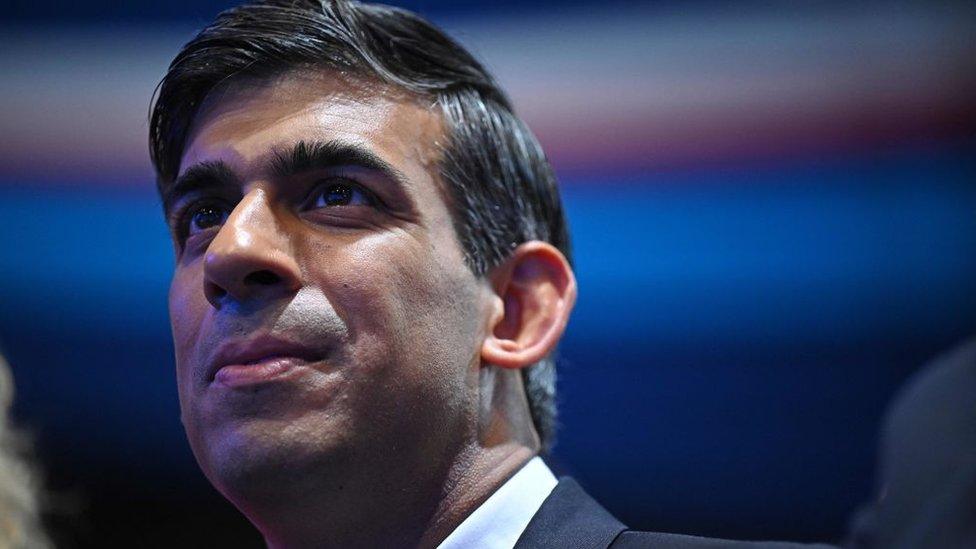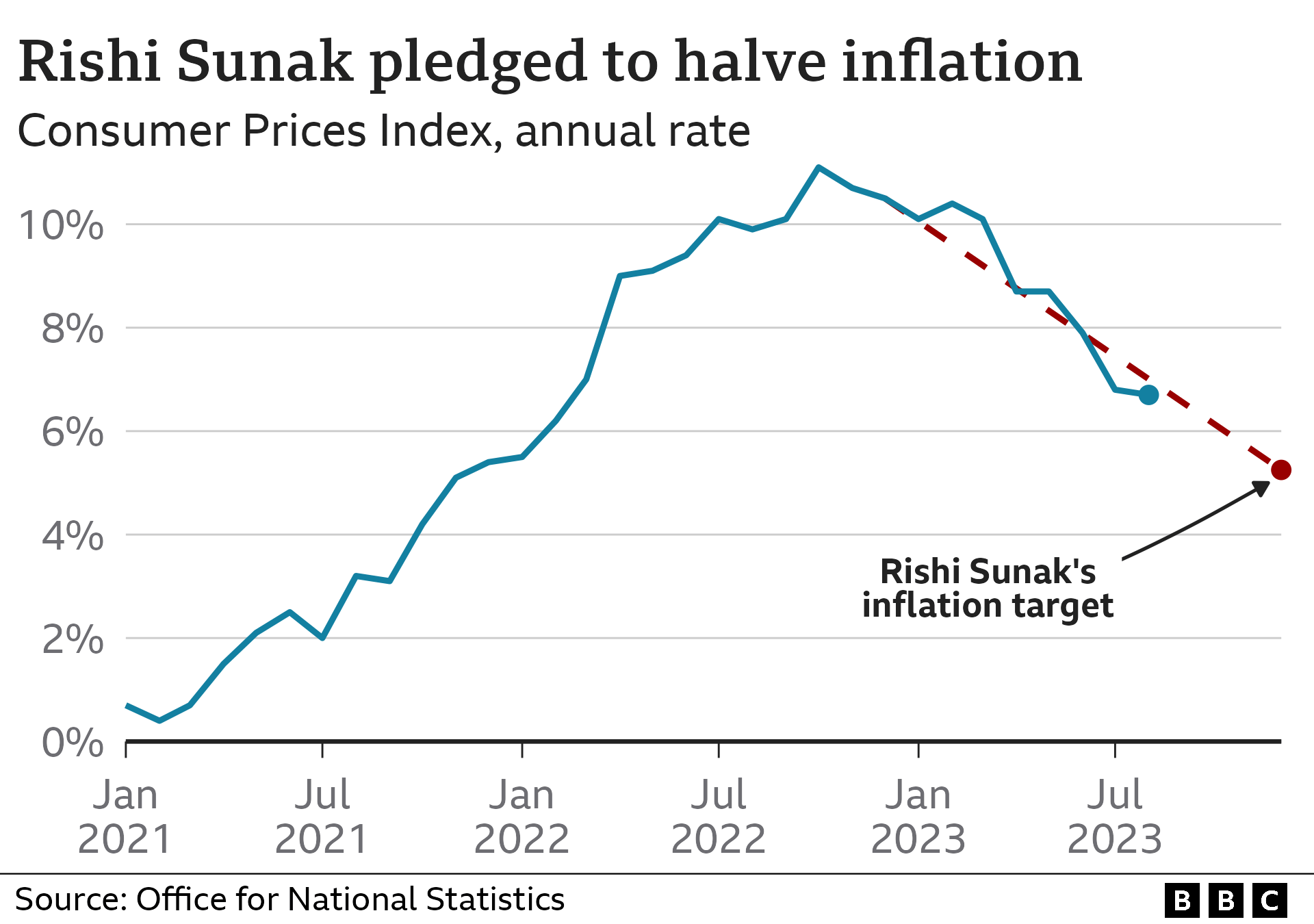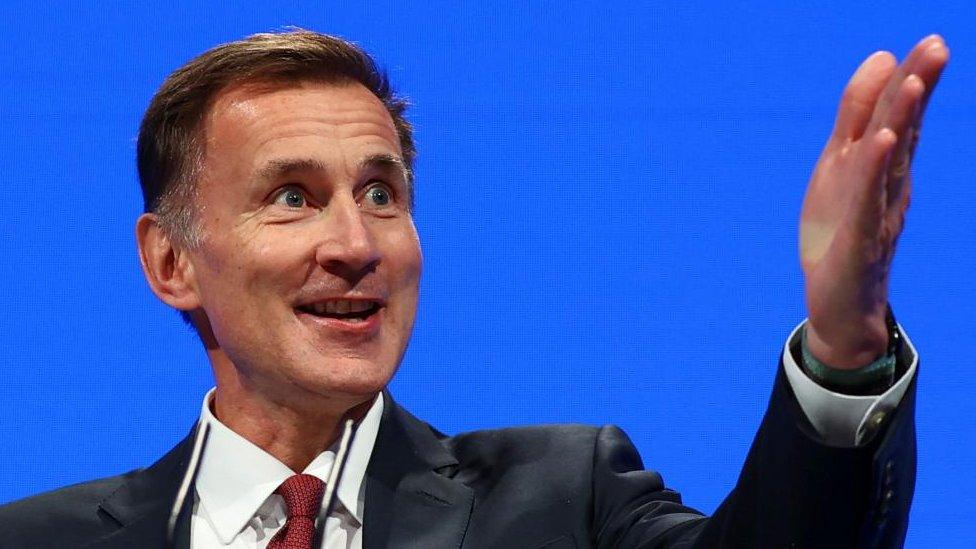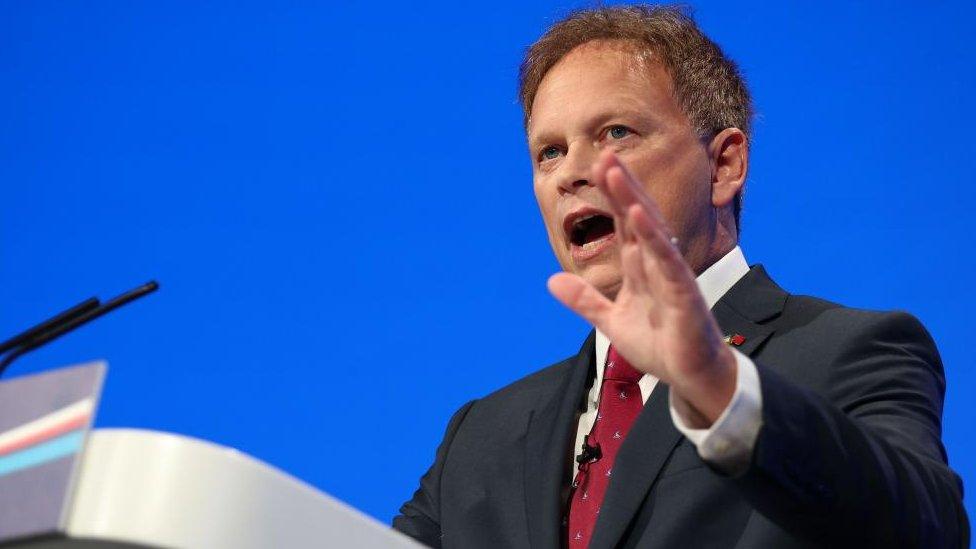Would Labour tax meat? And other Conservative claims checked
- Published

Rishi Sunak and his government ministers have been busy making speeches and giving interviews at the annual Conservative party conference.
Here are some of the claims from their time in Manchester.
Would Labour take 100,000 of Europe's asylum seekers?
In his speech, Mr Sunak said: "Labour's plan is to cook up some deal with the EU which could see us accepting around 100,000 of Europe's asylum seekers."
The Conservatives first used this figure in September, after Labour said it would seek a returns agreement with the EU.
But the 100,000 figure is misleading. The Conservatives worked it out by claiming that Labour would be forced to take a share of the EU's migrant quota, worked out according to population size.
The party's press release said around a million asylum seekers arrived in the EU in 2022. The UK's population is just under 13% of the EU's, so - it claimed - this would mean Labour taking more than 100,000 asylum seekers a year.
But the EU has no such scheme in place. It is negotiating a deal which includes relocating at least 30,000 asylum seekers a year between EU member states based on several criteria, including population size. The countries would not be forced to take asylum seekers and could choose to make a payment instead.
Labour has said it would not join an EU quota scheme because the UK is no longer an EU member. It has not said how many asylum seekers it would accept under any future deal it negotiated.
Is Labour planning a meat tax?
Energy Secretary Claire Coutinho told the conference: "It's no wonder Labour seems so relaxed about taxing meat".
We asked Labour whether they were considering introducing a meat tax. They replied: "Taxing meat is not Labour policy".
Pressed by Sophy Ridge on Sky News, external about her claim, Ms Coutinho said it was "good to have a light moment in your speech".
Is inflation a tax?
Speaking on the BBC's Laura Kuenssberg's programme, the prime minister would not promise to cut taxes and instead wanted to focus on inflation.
He said: "The best tax cut I can deliver for the British people is to halve inflation."
When challenged on this he repeated: "Inflation is a tax."
Inflation is not a tax, although high inflation can clearly make people worse off because it means higher prices.
A tax is a charge or levy made by a government, typically to pay for services.
Mr Sunak also wanted to highlight his record in reducing inflation. He said: "I spent the first year stabilising things, making progress on bringing inflation down."

The PM's pledged to halve it from 10.7% at the end of 2022, to 5.3% by the end of 2023 and it has been coming down.
Despite the recent falls - to 6.7% in the year to August - analysts remain divided about whether the PM's goal will be achieved.
However, the Bank of England said that it expected inflation to be about 5% by the end of the year., external
Core inflation, which strips out factors like energy and food - which are more vulnerable to global price swings - has seen only a modest reduction.
Does HS2 cost 10 times more than similar projects in France?
Before the prime minister scrapped part of HS2, his chancellor Jeremy Hunt was already warning about spending on the project.
He said "it costs 10 times more" to build high speed rail in the UK than France.

BBC Verify asked the Treasury how this figure was calculated. It did not provide the detail, directing us instead to the Conservative Party, which did not reply.
There are no recent comparisons between the cost in France and the UK.
In 2015, a House of Lords report, external estimated the cost of building HS2 at "up to nine times higher than the cost of constructing high speed lines in France".
The report estimated the HS2 Phase One construction (which started at 2017) cost at around £90m per kilometre while similar projects in France, carried out between 1990 to 2011, cost between £9m-£15m per kilometre (in 2010 prices).
The report said possible reasons for the price difference include expensive tunnelling required in the UK but not in France, the cost of a new station at Birmingham and renovation of Euston station, as well as the state of the UK railway construction industry.
Has the UK decarbonised faster than any other country?
Mr Sunak also told BBC News the UK had decarbonised faster than any other country in the G7.
The G7 (Group of Seven) is an organisation of the world's seven largest "advanced" economies, which includes the UK.
It is true the UK has decarbonised faster than other countries in this group when comparing cuts to greenhouse gas emissions since 1990.
UK emissions had fallen by 48.7% up to the end of 2022, external, according to government data.
This figure refers to greenhouse gas emissions within the UK. It does not account for the UK's total carbon footprint, which includes emissions related to the manufacture of products that the UK imports from abroad, for example.
Is the UK the second biggest contributor of military aid to Ukraine?
Defence Secretary Grant Shapps told the conference: "We have provided billions in military aid (to Ukraine) - second only to the contribution of the US."
The US is by far the largest contributor of arms to Ukraine - providing £24.6bn ($29.8bn) in security assistance, external to Ukraine since Russia invaded in February 2022.
The UK gave £2.3bn ($2.8bn) billion in 2022, and pledged the same amount in 2023, external - taking its total commitments to £4.6bn ($5.6bn) since the start of the war.
However, Germany has committed to providing £6.4bn ($7.7bn) over the same period, external, which would put it second to the US, in front of the UK.
Germany provided £1.7bn ($2.1bn) in military aid in 2022 and pledged a further £4.7bn ($5.7bn) for 2023.

It is possible that Mr Shapps was basing his claim on 2022 military aid alone, but this wasn't made clear in his speech.
We have asked the UK Ministry of Defence to clarify his comments.
The Kiel Institute, a team of researchers which tracks the amount countries have pledged in military aid to Ukraine, also puts Germany in second place ahead of the UK, external.

